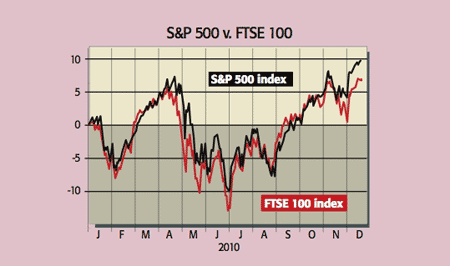Get the latest financial news, insights and expert analysis from our award-winning MoneyWeek team, to help you understand what really matters when it comes to your finances.
You are now subscribed
Your newsletter sign-up was successful
Want to add more newsletters?

Twice daily
MoneyWeek
Get the latest financial news, insights and expert analysis from our award-winning MoneyWeek team, to help you understand what really matters when it comes to your finances.

Four times a week
Look After My Bills
Sign up to our free money-saving newsletter, filled with the latest news and expert advice to help you find the best tips and deals for managing your bills. Start saving today!
2010 turned out to be a good year for equities. The FTSE All-World index has climbed by 8%. US shares have gained around 10%, while the main UK and pan-European indices are up by 7%-8%. All these markets are now back to their pre-Lehman levels. Analysts are forecasting similar gains in 2011. No surprise there, says Buttonwood on Economist.com. Strategists always seem to be optimistic. The "typical equity forecast" is "x (where x is the current level) plus 10%".
At first glance, one can understand "the general bullishness", says Buttonwood. Stocks are still in a sweet spot. Ample liquidity, especially after the Fed's latest bout of money printing (QE2), is juicing asset markets. But there is scant sign yet of interest-rate hikes to temper the recovery.
Yet it's hardly as though all is well, says James Mackintosh in the FT. Stockmarkets are "ignoring that fact" that the world's biggest economy remains "reliant on government stimulus". The latest boosts from worried authorities are QE2 and the tax-cut package. If the economy can avoid stalling, it may suffer from "inflation reigniting", says Rob Arnott of Research Affiliates. Any sign of inflation reviving would raise the prospect of dearer money and rattle stocks.
MoneyWeek
Subscribe to MoneyWeek today and get your first six magazine issues absolutely FREE

Sign up to Money Morning
Don't miss the latest investment and personal finances news, market analysis, plus money-saving tips with our free twice-daily newsletter
Don't miss the latest investment and personal finances news, market analysis, plus money-saving tips with our free twice-daily newsletter

Meanwhile, the eurozone, "to put it mildly, still has issues", as HSBC's Stephen King puts it. The debt crisis looks far from over and concern over a potential break-up of the single currency area remains a realistic scenario. In Britain a key danger is stubborn inflation eroding purchasing power and threatening private spending amid the public squeeze. The bottom line is that "the Western world remains on economic and financial life support". The East could pose a danger too especially if China can't temper growth without choking it off as it tries to deal with inflation.
There is no reason for markets to race ahead, says Albert Edwards of Socit Gnrale. What we're seeing is a repeat of the 2005-2007 period. In the absence of a genuinely healthy recovery, the Fed is trying to blow up asset markets to boost the economy via the 'feel-good' factor. It ended in tears last time, and it will again, whether the "inevitable implosion" comes in 2011 or not. Given the potential pitfalls ahead, we would stick with defensive equities and hang on to gold.
Get the latest financial news, insights and expert analysis from our award-winning MoneyWeek team, to help you understand what really matters when it comes to your finances.
MoneyWeek is written by a team of experienced and award-winning journalists, plus expert columnists. As well as daily digital news and features, MoneyWeek also publishes a weekly magazine, covering investing and personal finance. From share tips, pensions, gold to practical investment tips - we provide a round-up to help you make money and keep it.
-
 Should you buy an active ETF?
Should you buy an active ETF?ETFs are often mischaracterised as passive products, but they can be a convenient way to add active management to your portfolio
-
 Power up your pension before 5 April – easy ways to save before the tax year end
Power up your pension before 5 April – easy ways to save before the tax year endWith the end of the tax year looming, pension savers currently have a window to review and maximise what’s going into their retirement funds – we look at how

